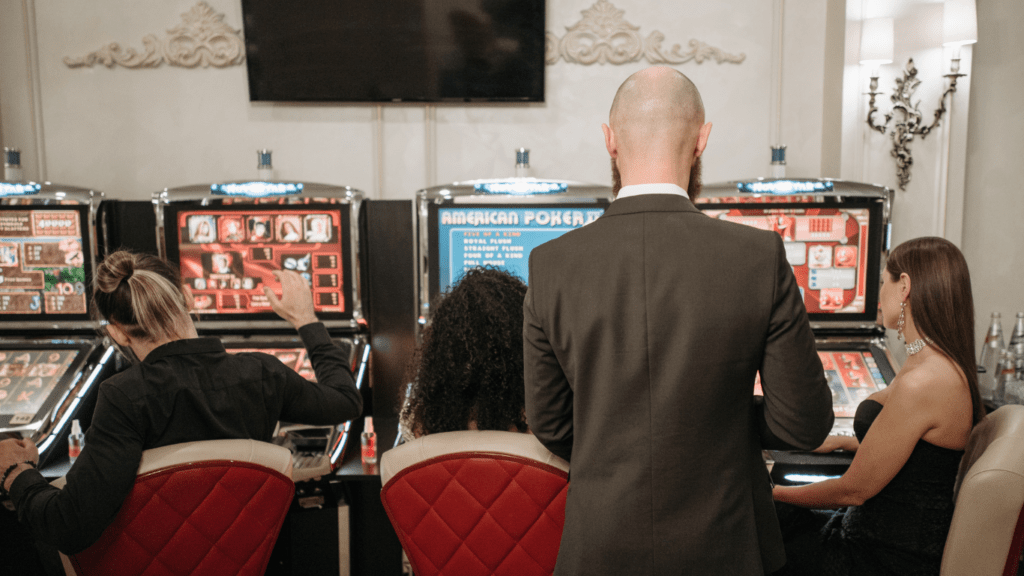Understanding the Psychology of Gambling
The Role of Reward Systems
The brain’s reward systems play a huge role in gambling behavior.
The mesolimbic pathway, responsible for processing rewards, releases dopamine when anticipating or experiencing pleasurable activities like gambling.
This rush of dopamine creates a feeling of euphoria, enticing people to continue gambling to recreate the sensation.
For example, slot machines use intermittent reinforcement by providing unpredictable rewards, which can make the gambling experience seem more thrilling and addictive.
Dopamine’s impact on the brain reinforces gambling behavior by associating it with positive feelings.
However, the inconsistency of rewards can lead to prolonged gambling sessions in hopes of hitting a big win, often resulting in significant financial losses.
If one understands the influence of these reward systems, maintaining control becomes easier.
Cognitive Biases in Gambling
Cognitive biases can distort decision-making processes in gambling.
Common biases like the Gambler’s Fallacy, the mistaken belief that past events influence future outcomes, can lead to irrational betting.
For instance, thinking that a slot machine is “due” for a win after a series of losses can encourage continued play, despite each spin being independent.
The Illusion of Control, another cognitive bias, occurs when gamblers overestimate their ability to influence outcomes.
Believing that they have a strategy or special skill affects their perceived chances of winning, leading to more engaged and riskier behavior.
Understanding these biases can help in recognizing irrational thoughts and maintaining rational gambling practices.
By knowing about reward systems and cognitive biases, one can better navigate the psychological traps of gambling, promoting responsible and controlled gambling habits.
Signs of Losing Control in Gambling
Recognizing Risky Behaviors
Compulsive gambling often starts with subtle changes. Identifying these behaviors early can prevent more severe issues.
Some common risky behaviors include:
- Chasing Losses: Frequent attempts to win back lost money by continuing to gamble often indicate loss of control.
- Increasing Bets: Gradually raising bet amounts to achieve the same thrill may signal a developing problem.
- Neglecting Responsibilities: Ignoring work, family, or social obligations to gamble demonstrates a shift in priorities.
- Lying About Gambling: Hiding gambling activities or lying about losses highlights secrecy and shame, common in problem gambling.
- Borrowing Money: Seeking loans or selling possessions to fund gambling suggests financial strain tied to gambling habits.
Recognizing these behaviors can guide individuals toward seeking help before the situation escalates.
Emotional Triggers to Watch
Emotions often influence gambling behavior. Identifying these emotional triggers can help maintain control:
- Stress: High stress levels may lead individuals to gamble as a form of escape or relief.
- Boredom: Limited engagement in hobbies or social activities might drive someone to seek excitement through gambling.
- Anxiety: Anxiety can push individuals to gamble, falsely believing it offers a quick solution to their worries.
- Depression: Feelings of sadness often lead people to gamble, seeking temporary happiness or distraction.
- Euphoria: Winning big can create euphoria, which may cause overconfidence and lead to further risky gambling decisions.
Being aware of these emotional states helps in understanding one’s gambling behavior and implementing strategies to avoid loss of control.
Strategies to Maintain Control While Gambling

Setting Practical Limits
Establishing strict boundaries can help manage gambling behavior.
Define time and monetary budgets before starting a gambling session. For example, allocate only $50 for a session and an hour of playtime.
Use self-imposed limits to ensure you stop when you reach these thresholds.
Several online gambling platforms offer tools for setting deposit, loss, and time limits. Utilize these tools to stay within pre-defined boundaries.
Track your gambling sessions in a journal, noting time spent, money wagered, and emotional state. This record can help identify patterns and prevent excessive gambling.
The Importance of Support Systems
Engaging with supportive networks aids in maintaining gambling control.
Surround yourself with friends and family who encourage responsible behavior. Share your gambling goals and limits with them to create accountability.
Participate in support groups like Gamblers Anonymous for additional guidance and community.
These groups offer meetings and forums for discussing challenges and sharing experiences.
Professional help from therapists specializing in gambling addiction can provide structured strategies to manage gambling habits.
Recognize the value of external support in maintaining control and preventing gambling-related issues.
The Role of Therapy in Managing Gambling Habits
Therapy plays a crucial part in managing gambling habits, employing cognitive techniques and professional guidance to help individuals regain control.
Different therapy methods offer tailored approaches to address the unique challenges of gambling addiction.
Cognitive Behavioral Therapy (CBT) Techniques
CBT proves effective in changing gambling behaviors by targeting thought patterns and emotional responses. It focuses on identifying and altering distorted beliefs that drive gambling urges.
Techniques include:
- Cognitive Restructuring: Identifying and challenging irrational beliefs, like the misconception of “winning streaks”, to replace them with realistic thoughts.
- Exposure Therapy: Gradually exposing individuals to gambling situations in a controlled environment, reducing the emotional impact over time.
- Problem-Solving Skills Training: Teaching ways to handle stress and high-risk situations without resorting to gambling.
When to Seek Professional Help
Recognizing the signs that professional help is needed can prevent gambling from escalating into severe addiction. Indicators include:
- Uncontrollable Urges: Persistent, overwhelming thoughts about gambling that interfere with daily activities.
- Financial Strain: Inability to manage finances due to excessive gambling, leading to debts or selling possessions.
- Emotional Instability: Frequent mood swings, anxiety, or depression linked to gambling losses or cravings.
Seeking therapy from specialists in gambling addiction provides structured support. Professional guidance, combined with CBT, offers a robust framework for managing and overcoming gambling habits.


 Alpha Ricketts - Senior Analyst Alpha Ricketts serves as Senior Analyst at Jackpot Journey Spot, bringing valuable insights into market trends and game strategies. With a background in data analysis and a passion for understanding the nuances of gaming behavior, Alpha helps shape the site’s focus on responsible gaming by providing data-driven insights that keep readers ahead of the curve.
Alpha Ricketts - Senior Analyst Alpha Ricketts serves as Senior Analyst at Jackpot Journey Spot, bringing valuable insights into market trends and game strategies. With a background in data analysis and a passion for understanding the nuances of gaming behavior, Alpha helps shape the site’s focus on responsible gaming by providing data-driven insights that keep readers ahead of the curve.
